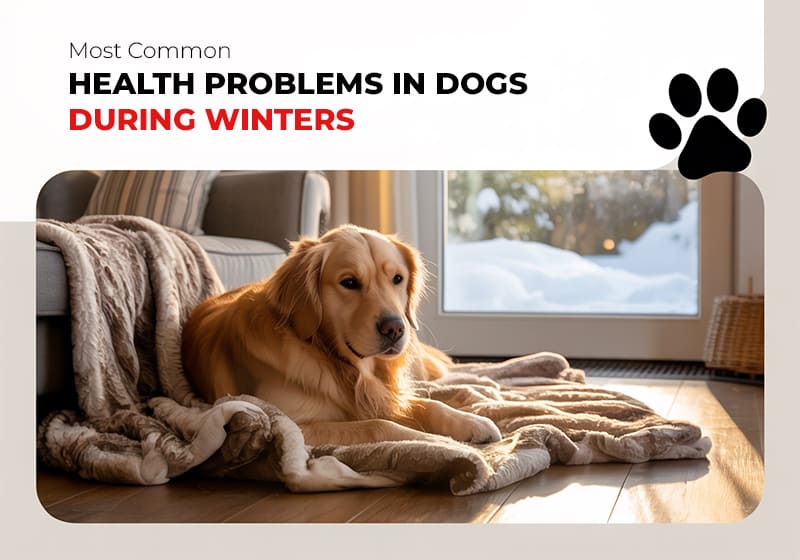
While you may appreciate the cozy blankets coming out and the echo of upcoming festivals with the temperature going down, it may not be the same for your furry companions. Winter brings a unique set of health challenges for dogs, from stiff joints and dry skin to respiratory troubles and weight gain.
But don’t worry! In this blog, we won’t just be listing problems. We’re here to guide you through the most common winter health issues dogs face and offer practical solutions to keep your pup safe, comfortable, and happy all season long.
Let’s get started!
Common Health Issues Dogs Face in Winters
In this segment, we’ll discuss the various health issues dogs face in winter.
Joint Pain and Arthritis
Winter and joint pain go hand in hand, as the cold weather tends to stiffen joints and make movement challenging. Moreover, the cold temperatures may aggravate signs of arthritis in senior pets or trouble those with joint issues.
To alleviate the joint discomfort, provide comfortable bedding or support by installing ramps for easy climbing up the beds or couches. You can also introduce joint care supplements such as Mobiflex Joint Care or Arthritis Care into their diets after consulting with your vet.
Respiratory Issues
Just like us, our chilly wind can get the best of our furry friends and cause respiratory issues like coughing and sneezing. Moreover, certain short-nosed breeds like Bulldogs and Pugs are more susceptible to breathing difficulties in winter.
So minimize their exposure to cold weather and plan walks during the warmer times of the day. Furthermore, when going out, layer them properly and use traction socks or booties to protect them from the chill.
Dry Skin and Coat
The snowy landscapes and the dry winter wind can take a toll on your dog’s skin, leading to itchiness, flakiness, and discomfort. Similarly, their paws may crack or become infected if they are exposed to cold surfaces or de-icing agents.
Therefore, regular grooming is essential to keep your pet’s skin and paws safe. You can also use a balm such as Dorwest Paw and Nose Balm or a skin & coat care like Dorwest Garlic & Fenugreek Tablets to help them navigate winters comfortably.
Also Read: Why You Should Choose Dorwest for Your Pet’s Joint and Skin Wellness
Dehydration
In winter, dehydration is commonly observed in pets as they tend to drink less water. To avoid such a situation, you need to encourage them to drink water and ensure they take adequate fluids.
So, make sure fresh drinking water is available at all times and find creative ways to keep them hydrated. You can craft games around food & drinking water, or try incorporating wet foods into their diet.
Cold-weather Injuries
The dropping temperature is harsh on pets and can invite multiple issues and injuries. They may suffer from hypothermia, which can result in organ failure, coma, and death if their body temperature falls too low.
Frostbite, which damages tissue in the ears, tails, and paws, is another risk they face. Smaller breeds, elderly dogs, and dogs with shorter coats are more susceptible to the cold and need special care.
Weight Management
The snow-covered roads and chilly winds often limit the movement of both us and our furry friends. With days getting shorter, they may also show a lack of interest owing to seasonal depression, which is commonly observed during winter.
This reduced activity level actively leads to them gaining a few extra pounds. Therefore, it’s crucial to keep them engaged and get them the necessary exercise to keep their weight in check.
Preventive Measures to Protect Dogs Against Winter Issues
Practice these measures to keep your beloved dog safe from the dangers of winter:
- Keep your dog indoors in extremely cold weather and limit outdoor time.
- Use pet-safe paw balms and wipe their paws, especially after walks, to remove irritants.
- Get booties and jackets to protect them from the cold.
- Maintain regular grooming and take care of their skin and coat.
- Consult your vet and provide the right supplements for joint care.
- Ensure your dog remains active and hydrated, even in colder weather.
- Protect your dog from antifreeze by storing it safely.
- Provide a balanced and nutritious diet.
- Make sure your pet gets an adequate amount of physical and mental stimulation.
Also Read: Do Dogs Need Flea and Tick Protection During Winters?
Parting Words
Winter may be harsh, but with a little extra care and attention, your dog can thrive through the cold months. From comfortable bedding and protective gear to nutritious diets and joint support, these small steps can help prevent discomfort and serious health risks. Put the information shared in this blog to good use and help your furry companion navigate the winter with ease.
